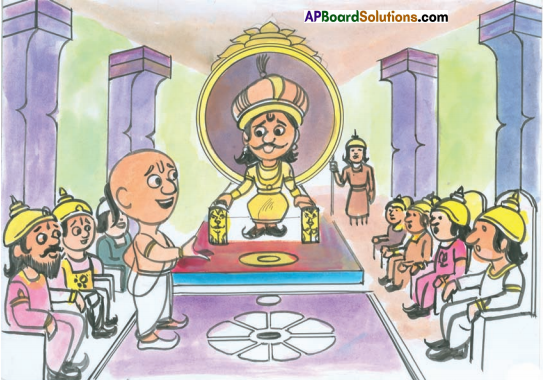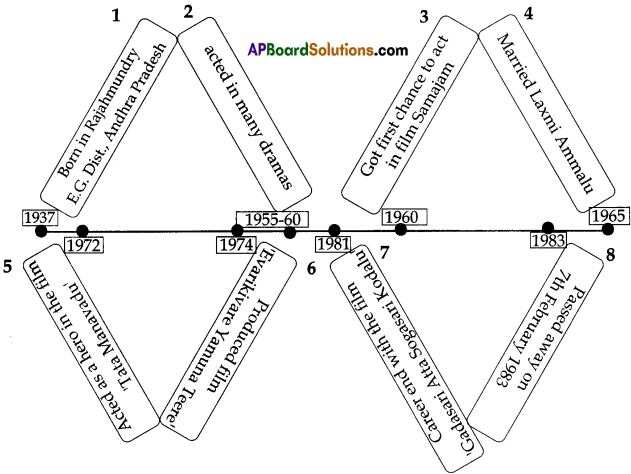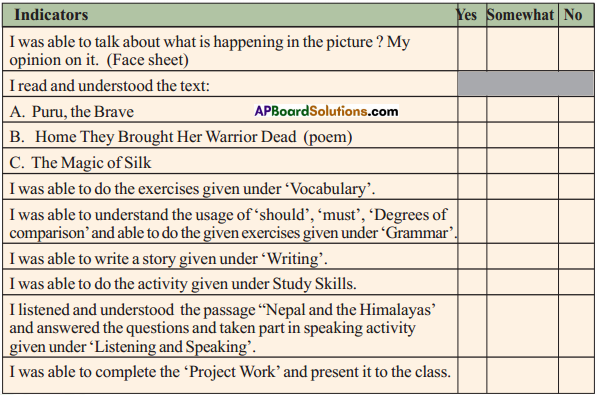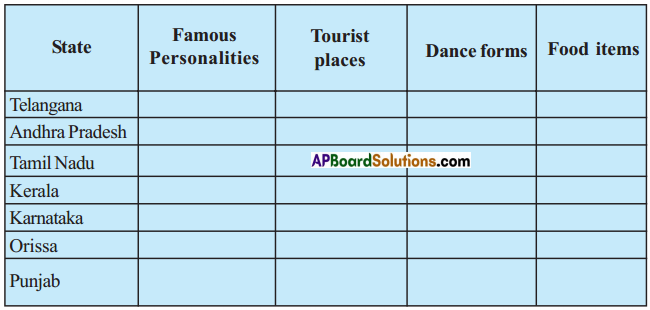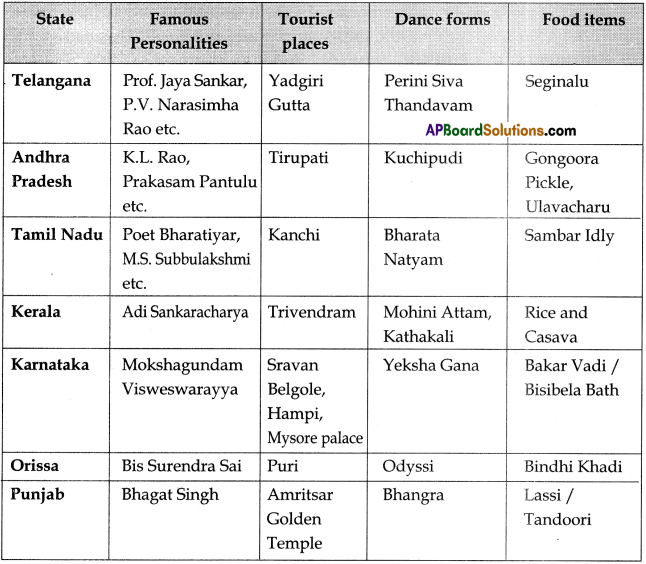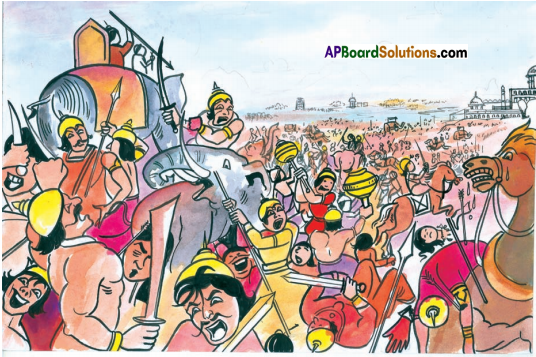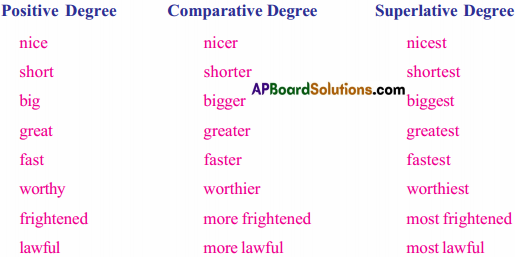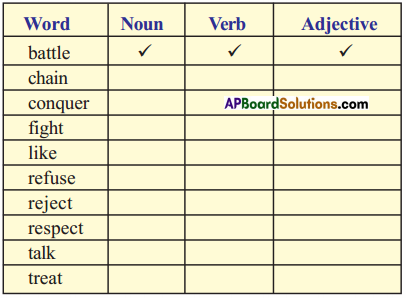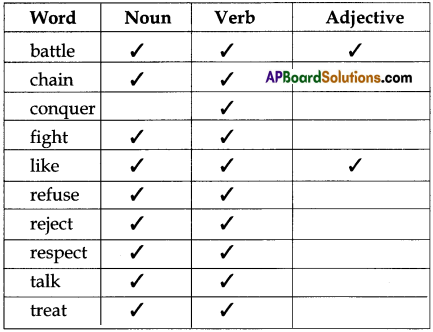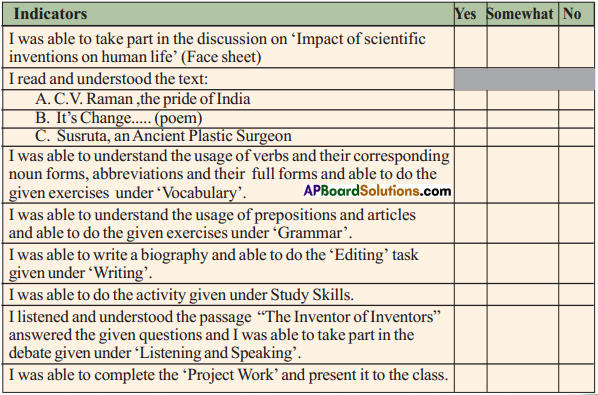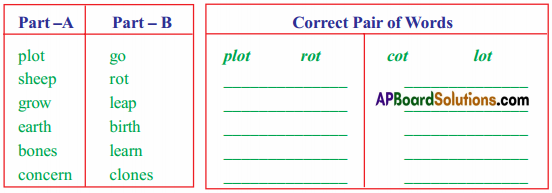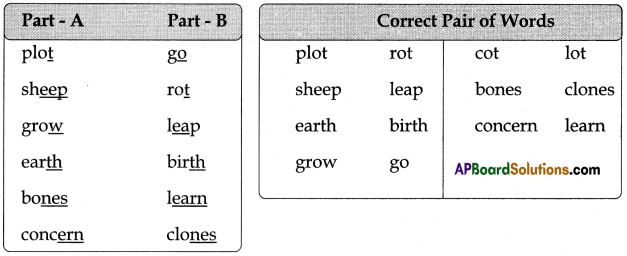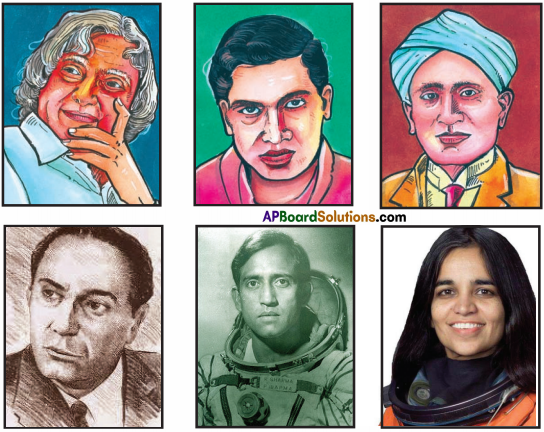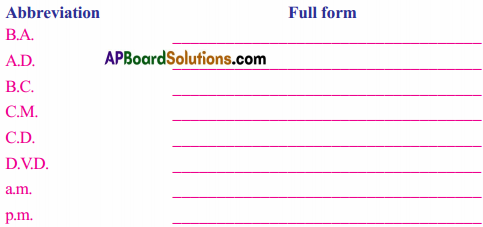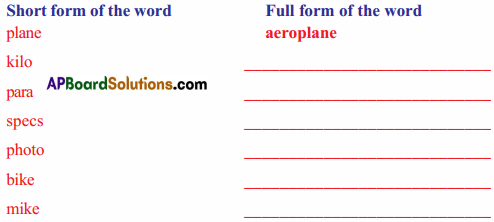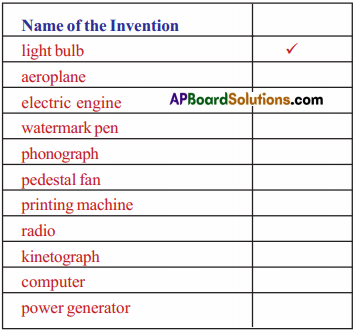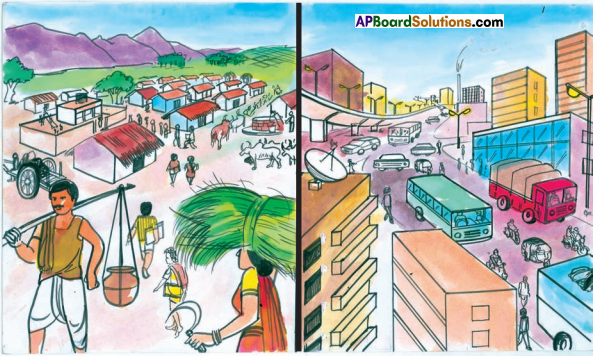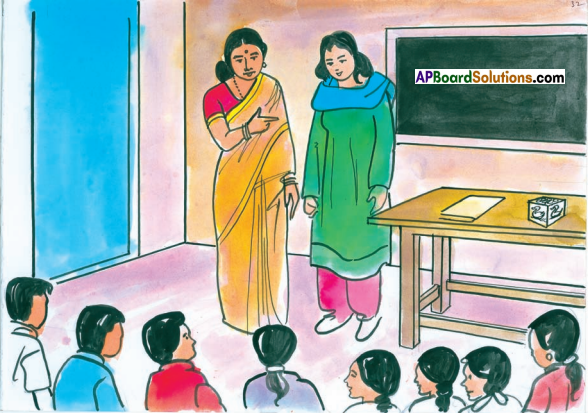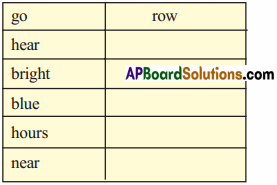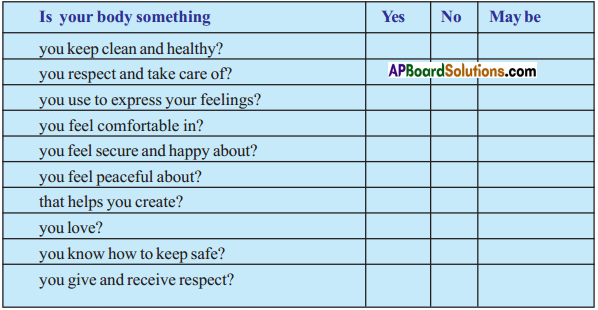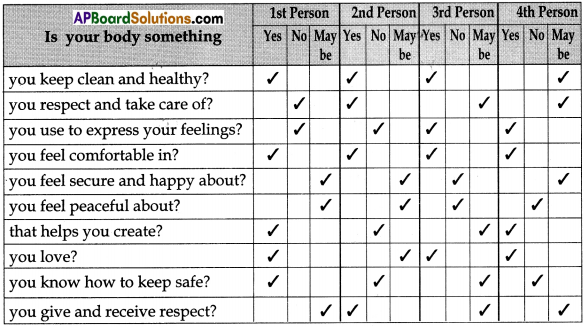Telangana SCERT 7th Class English Government Textbook Answers Telangana Unit 1A The Town Mouse And The Country Mouse Textbook Questions and Answers.
TS 7th Class English Guide Unit 1C The New Blue Dress
Answer the following questions :
Question 1.
What kind of a street was Gates Avenue at the beginning of the story ?
Answer:
Gates Avenue was a short street in the city of Cleveland. It was dirty and ugly at the beginning of the story. The houses were not painted and did not have running water. There were no street lights and pavement. The railway trad at the end of the street added noise and dirt to it.
Question 2.
What happened to Gates Avenue by the end of the story ?
Answer:
At the end of the story, Gates Avenue had a street light and a good pavement The houses were painted and running water was provided. It had become tidy street where respectable citizens lived.
The ‘New Blue Dress’ presented by the teacher to a little girl brought about the change to Gates Avenue.
Question 3.
Why do you think the teacher gave the blue dress to the little girl ?
Answer:
The teacher observed the little girl wearing the same dirty dress throughout the winter as well as spring. She continued to wear the same dirty dress ever after the teacher had asked her to get it washed. The teacher understood that she had no other dress to wear. She took pity on the girl and gave her a new blue dress.

Question 4.
What change did the new blue dress bring in the little girl’s house ?
Answer:
Inspired by her daughter’s neat appearance in new blue dress, the mother started cleaning the house and laid a table cloth on the kitchen table. Her father repaired the fence and began to make a garden with the family members’ help.
Question 5.
How did the change in the little girl’s house influence the neighbours ?
Answer:
On watching the changes in the little girl’s house, the neighbours also began to paint their houses and keep them clean and tidy.
Question 6.
Why did Gates Avenue look dirty and ugly ?
Answer:
Gates Avenue looked dirty and ugly because the houses were not painted for many years. They did not have running water. There were no street lights’ and pavement; and the railway line added noise and dirt to it.
The people who lived in Gates Avenue were very poor and never expected to have any more facilities. So it continued to look ugly without the least facilities like running water, street light, pavement etc.
Question 7.
‘Her teacher sighed.’ Why do you think she sighed? What does it tell us about the teacher ?
Answer:
The teacher sighed out of pity as the girl was so nice and hardworking. She was friendly and polite. She was even pretty but, covered with dirt. The sighing of the teacher shows that she was kind-hearted and sympathetic towards the girl.

Question 8.
What were the nice things about the little girl ? What were the not-so-nice things?
Answer:
The nice things about the little girl were her hardwork in school, politeness and friendly nature. The not-so-nice things about her were her dirty face and untidy hair.
Question 9.
What did the teacher think when the girl continued to wear the same dirty dress? Was she right? Why do you think so ?
Answer:
When the girl continued to wear the same dirty dress, the teacher thought that her mother was probably not interested in her. She was right in thinking so. I think so because her face was charming and pretty but the dress was ugly.
Question 10.
Two things amazed the little girl’s father. What were they ?
Answer:
The little girl’s father was first amazed at how pretty his daughter looked in her clean new blue dress. The second thing that amazed him more was the cloth on the kitchen table.
Question 11.
Why did the minister want to help the people of Gates Avenue? What did he do to help them ?
Answer:
The minister observed the people in Gates Avenue working to keep their houses and surroundings clean. He thought that the people who tried hard to make their homes decent, deserved help. He asked some important citizens in the community to help them.
Question 12.
How did the Gates Avenue story influence other communities ?
Answer:
The people of the other communities heard the story of Gates Avenue’s developments and were inspired by it. They started their own ‘clean up’ campaigns and started repairing and painting the houses to live in a better way.

How well did I read?

Self Assessment:
How well have I understood this unit?
Read and tick (✓) in the appropriate box.
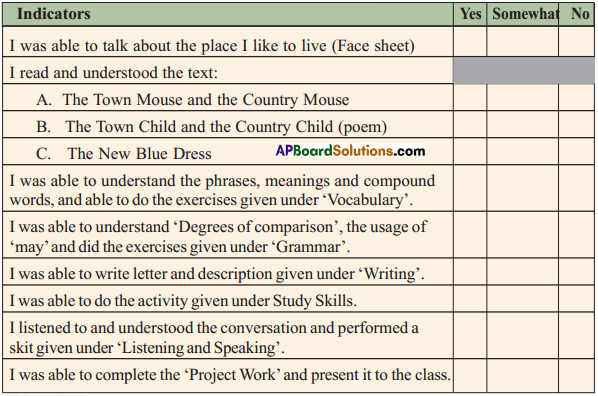

The New Blue Dress Summary in English
Gates Avenue was a short street but ugly. The people who lived there were very Poor. Their houses were not painted. They didn’t even have running water. There were 10 pavement and streetlights. The little girl from Gates Avenue wore the dirty dress hat she had worn all winter. Her teacher was very unhappy about her because her face was dirty and her hair was untidy although she was nice and a brilliant student. One lay the teacher asked her to clean her face and come to school.
The next morning her ace was clean and her hair tidy. But there was no change in her dress. She wore the same dress. Then her teacher brought a new blue dress and gave it to her. The next morning she came to school in her new blue dress and she was clean and tidy. Her father was amazed to see her very pretty in her new dress. He was more amazed to see i table cloth. His wife told him that they were going to begin to be neater. The girl’s mother washed the kitchen floor. Her father repaired the fence.
He began to make a garden. His neighbour watched him and he too cleaned and painted his house. While a minister was going through the Avenue, he found that there were no pavement, streetlight and running water. So, he worked hard to provide those facilities for the people of Gates Avenue. Thus Gates Avenue had become a tidy street. On hearing this, more than seven thousand towns and cities organised ‘clean up’ programmes. A ‘new due dress’ caused all these changes.

Glossary:
pretty – beautiful
spring – season of flowers and fruits
probably – Perhaps
polite – good mannered
untidy – not neat
eagerly – anxiously
deserve – worthy to have
running water – water coming from a main supply
pavement (n) – footpath
railroad (n) – railway
excitement (n) – strong feelings
amazed (adj) – filled with great wonder
minister (n) – (here) priest in charge of church
decent (adj) – respectable
community (n) – people living in one place
organize (v) – to arrange; to make preparations
campaigns (n) – series of planned activities to do something
Section – A : Reading Comprehension:
Please also practise additional exercises given from P.No. 38 to 50:
(Questions 1 -10) : Read the passage from the lesson “The New Blue Dress”.
Their houses had not been painted for many years, and they did not even have running water. The street itself was ugly too. There was no pavement, there was no streetlight; and the railroad at the end of Gates Avenue added noise and dirt.
The other girls in the school near Gates Avenue wore new and pretty clothes that spring. But the little girl from Gates Avenue still wore the dirty dress that she had worn all winter. Probably that was the only dress she owned.
Her teacher was very unhappy. The little girl was so nice ! She always worked hard in school; she was always friendly and polite. Her face was dirty and her hair was untidy, but anyone could see that she was pretty under the dirt.
Now, answer the following questions. Each question has four choices. Choose the correct
answer and write (A), (B), (C) or (D) in your answer booklet. 5 × 1 = 5 M
Question 1.
The teacher was unhappy because ( )
A) she had to attend Gates Avenue
B) The street was ug!y
C) the little girl looked dirty
D) the little girl was pretty
Answer:
C) the little girl looked dirty
Question 2.
The street itself was too. ( )
A) worst
B) bad
C) worse
D) ugly
Answer:
D) ugly
Question 3.
What is the name of the place mentioned . in the passage? ( )
A) Gates Avenue
B) Pitsburg
C) Hamilton
D) Canada
Answer:
A) Gates Avenue
Question 4.
The season mentioned in the passage is ( )
A) Summer
B) Spring
C) Winter
D) Rainy
Answer:
B) Spring
Question 5.
The little girl was always friendly and……….. ( )
A) kind
B) polite
C)happy
D) charming
Answer:
B) polite

(6 – 10) Answer the following questions in two or three sentences each. (5 × 2 = 10M)
Question 6.
How were the houses in the place, Gates Avenue ?
Answer:
The houses in the place, Gates Avenue had not been painted for many years. They didn’t have running water.
Question 7.
Describe Gates Avenue.
Answer:
In Gates Avenue, streets had no pavement and street lights. They even had no running water. The rail road at the end of it added noise and dirt.
Question 8.
How were the girls in Gates Avenue during the spring ?
Answer:
The girls were clean and tidy and wore new dresses during the spring.
Question 9.
What kind of a girl was the little girl ?
Answer:
The little girl was very kind, polite and friendly with others. She was also a nice girl and was hard working.
Question 10.
How was the little girl in the spring season ?
Answer:
The little girl’s hair was very untidy, (her face was dirty) and she wore the same dress which she wore the last season.

(Questions 11 – 16) : Read the bar graph and answer the questions given below.

(11 – 12) Now, answer the following questions. Each question has four choices. Choose the correct ansvyer and write (A), (B), (C) or (D) in your answer booklet. 2 × 1 = 2 M
Question 11.
In which year was the food production the highest ? ( )
A) 1978 – 79
B) 1988 – 89
C) 1970 – 71
D) 1989 – 90
Answer:
D) 1989 – 90
Question 12.
In which year was the food production the least ? ( )
A) 1975 – 76
B) 1976 – 77
C) 1970 – 71
D) 1987 – 88
Answer:
C) 1970 – 71
(13 – 16) Answer the questions in two or three sentences each. (4 × 2 = 8 M)
Question 13.
What does the bar graph represent ?
Answer:
The bar graph represents the particulars of food production during the years 1970 to 1990 in india.
Question 14.
In which years there is a fall in food production when compared to the preceeding years ?
Answer:
During the years 1976 – 77, 1986 – 87, 1987-88 there is a fall in food production compared to the preceeding year.
Question 15.
In which years there is increase in production more than that of the preceeding years ?
Answer:
During 75 – 76, 78 – 79, 83 – 84, 88 – 89 and 89 – 90.
Question 16.
Is it true to say that production of food doubled from 70 – 71 to 89 – 90 ?
Answer:
In 1970 – 71 production is 108 lakh tons and in 1989 – 90 it is 184 lakh tons. Hence it did not exactly double.

Section – B: Vocabulary & Grammar
Read the following passage focussing on the parts that are underlined and answer the questions given at the end. Write the answers in your answer booklet. (5 × 1 = 5 M)
Wilma Rudolph was born in a poor family in Tennessee. In (17) the age of four, she had pneumonia with scarlet fever which left her paralyzed (18) with polio. She had to wear a brace and the doctor said she would never put her foot on earth. But her mother encouraged her. She told Wilma that with God-given ability, persistence (19) and faith she could do anything she wanted. Wilma said, “I want to be the fastest (20) woman runner in the world.” At the age of nine, against the advice (21) of the doctor, she removed the brace and took the first step.
Question 17.
Replace the word with correct preposition. ( )
A) At
B) On
C) Up
D) With
Answer:
A) At
Question 18.
Noun form of underlined word. ( )
A) paralyze
B) paralysis
C) paralyse
D) paralyses
Answer:
B) paralysis
Question 19.
Meaning of persistence ( )
A) unwillingly (working)
B) taking hasty decision
C) plough the field
D) continuing to do something
Answer:
D) continuing to do something
Question 20.
Antonym of fastest ( )
A) shortest
B) slow
C) slowest
D) short
Answer:
C) slowest
Question 21.
Identify the part of speech ( )
A) noun
B) verb
C) adverb
D) adjective
Answer:
A) noun

(Q. 22 – 26) Complete the following passage choosing right words from those given below it. Each blank is numbered, and for each blank four choices (A), (B), (C) and (D) are given. Choose the correct answer from these choices and write (A), (B), (C) or (D) in your answer booklet. (5 × 1 = 5 M)
Once upon a time a Rajput king ruled Malwa. Though his __________ (22) was small, it was peaceful and calm. There were neither great wars nor political issues. Hence the king made it his aim to make his people happy.
One year there was severe drought. All cultivable lands dried up and cracked. Trees became bare. There were no flowers __________ (23) fruits. There were not any type of crops. The king felt sorry and always thought __________ (24) ways to save his people.
He walked to the shore of river Narmada. He knelt and prayed. “O holy river the Narmada ! Bless us with rain. If you save my people __________ (25) this famine, I shall offer you my first bom child” __________ (26) no time the whole sky was covered with clouds and there was torrential rain.
Question 22.
A) Empire
B) Kingdom
C) Palace
D) Province
Answer:
B) Kingdom
Question 23.
A) and
B) end
C) or
D) nor
Answer:
A) and
Question 24.
A) off
B) of
C) as
D) to
Answer:
B) of
Question 25.
A) since
B) for
C) from
D) over
Answer:
C) from
Question 26.
A) Without
B) Was
C) For
D) Within
Answer:
D) Within

(Q. 27-31) Read the following passage. Five sentences are numbered. Each numbered sentence has an error. Find the error and write the correct answer in your answer booklet. 5 × 1 = 5 M
(27) When everything is silent again, the town mouse crept out of the hole. He was quite cheerful again.
(28) “Come out now, cousin,” he told “That was only somebody opening the cupboard door. We are safe now.”
(29) But they were not safe for very long. Two more, they had to run for safety when somebody opened the cupboard door.
(30) The country mouse got quiet tired of running and hiding. “I want to go back to the country,” he said, “We may not get much food there, but at least we can eat in peace.”
(31) So, the next day, the country mouse go back to his house in the country and the town mouse stayed on in his cupboard in the town. And as far as I know, they did not visit each other again.
Ans:
27. was silent
28. he said
29. Twice more
30. got quite
31. went back
Question 32.
Read the following passage carefully and supply punctuation marks ” “) and capital letters, wherever necessary. Also correct the spelling of the underlined word. 5 M
Chimpanzees are more full of life than Gorillas and are to tame they also learn tricks better people who have studied them have found that it is possible to teach them things which make them seem almost human ; but in fact there is a big difference between a Chimpanzee and even a very stupid human being.
Answer:
Chimpanzees are more full of life than Gorillas arid are easier to tame. They also learn tricks better. People who have studied them have found that it is possible to teach them things which make them seem almost human ; hut in fact there is a big difference between a Chimpanzee and even a very stupid human being.
Question 33.
a) You have read the lesson “The New Blue Dress ”
Write a small conversation between the little girl and the teacher.
Answer:
Teacher : Good morning dear students
Students : Good morning mam
Teacher : (Viewing the little girl)
Oh! Dear girl why do you look so untidy and dull?
Little girl : Nothing ma’m. I’m alright.
Teacher : No, dear. You look so pretty and polite even though you are untidy.
Little girl : Fm from Gates Avenue mam.
Teacher : Oh really ! Then do one thing (a small favour). Tomorrow morning when you come to school, you please wash your face and come.
Little girl : Sure ma’m
(The next day the little girl comes with a pretty and beautiful face.)
Teacher : Hey dear. You look so cool. Do one more thing, you wash your dress and come tomorrow. (The next day the little girl comes to school in the same untidy dress.)
Teacher : Oh ! Think this little girl’s mother is not interested in her.
(So, she brought a new blue dress for her.)
Teacher : This is for you my dear
Little girl : I’m thankful to you ma’m.

(or)
b) Write a letter to your friend inviting him to your village during summer vacation.
Answer:
Madhira,
Date : XX.XX.XXXX
Dear friend,
I am fine here and hope the same with you there. How are you studying for your exams? I’m preparing well. This time I’m sure that I’ll get 10 points. What about you?
Actually I started writing this letter to invite you to my village during these holidays. As it is too hot this year you can enjoy my village and its cool pleasant climate. My village is totally surrounded by mountains, greenery and water streams. To tell about my house, it’s a very big house with good garden, coconut trees and so on. So, why to describe my village when you are going to come and stay with me for a few days. Will be waiting for you.
My regards to your parents and wishes to your sister.
Yours loving friend,
Kalyani.
Address on the envelope:
B.Anjali,
4th Block,
J.C. Colony,
Yadagirigutta,
Nalgonda District.
Question 34.
a) You heard the poem ‘The town child and the country child’ in your class. As you have the habit of writing a diary, write your feelings in your diary after going home.
Answer:
Time: 10:30 pm
Day – Sunday
Date : XX.XX.XXXX.
Dear Diary,
Today my day went on very well. I enjoyed my day especially because I heard a very beautiful poem named Town child and the country child’. It is really a very nice poem which tells us the inner feelings of a town child and a country child. Their personal feelings and their experiences when they change their places and after returning to their home place are brought out beautifully. Oh ! I really enjoyed the poem a lot.
(or)
b) The town mouse wanted to visit his cousin the country mouse. Imagine yourself as a town mouse and leave a message for the country mouse about your visit.
Answer:
My Dear Cousin,
I am leaving for your countiy on a small visit. I wish to see the beauty of your country and how you spend your life over there. I will start from here by tomorrow morning 6’o clock train. Please pick me up at the station.
By
Your cousin
The town mouse.

Additional Exercises:
Section – A : Reading Comprehension
Questions 1 – 10:
1. Read the following passage.
“This is how it is in the country,” his cousin replied. “It is always quiet in the country. Sometimes it is quieter than today. My grandfather says that our village is the quietest among all the villages in our district.” “Oh! Is it ? The country is a strange place,” said the town mouse. But he said to himself, “I don’t think I like this place.”
Next morning, the town mouse found that there was no breakfast ready. His cousin told him that they had to go to the nearby farm to search for food.
“We are sure to find something there,” he said. “A nice piece of root or a tender bit of sugar-cane.”
But the town mouse had enough. “Thank you, cousin,” he said. “But I think I’ll catch the next train home. I have suddenly remembered that I have forgotten something.”
A few days later, the country mouse wrote to his cousin, the town mouse. Here is the letter.
(1 – 5) Now, answer the following questions. Each question has four choices. Choose the correct answer and write (A), (B), (C) or (D) in your answer booklet.
Question 1.
Who used to say these words “Ours is the quietest village ? ( )
A) father
B) mother
C) cousin
D) grandfather
Answer:
D) grandfather
Question 2.
How is it in the country ? ( )
A) noisy
B) quiet
C) polluted
D) over crowded
Answer:
B) quiet
Question 3.
Where did both the mice go to search for food ? ( )
A) town
B) near by farm
C) to other holes
D) forest
Answer:
B) near by farm
Question 4.
What could both mice find in the near by farm ? ( )
A) a nice piece of root
B) grains
C) tender bit of sugar cane
D) both A and C
Answer:
D) both A and C
Question 5.
What is the relation between the town mouse and the country mouse ? ( )
A) sisters
B) cousins
C) brothers
D) nephews
Answer:
B) cousins

(6 – 10) Answer the following questions in one or two sentences each.
Question 6.
List the words used to describe the country side.
Answer:
The words are quiet, quitest among all the villages in the district and range.
Question 7.
According to the passage who visited the country side ?
Answer:
According to the passage the town mouse visited the country side.
Question 8.
What did the, country mouse’s grandfather say ?
Answer:
The county mouse grandfather said that, their village was the quitest among all the villages in the district.
Question 9.
What did the town mouse find out the next morning ?
Answer:
The town mouse found that there was no breakfast ready.
Question 10.
Why do you think that the town mouse left the country side ?
Answer:
I think the town mouse felt very comfortable in the country side so she left it.

2. Read the passage from “The New Blue Dress”.
One day the teacher said, “Won’t you wash your face before you come to school tomorrow morning? Please do that, just for me.”
The next morning the child’s pretty face was clean, and her hair tidy. Before the little girl went home that afternoon, the teacher said, “Now, dear, please ask your mother to wash your dress.”
But the girl continued to wear the same dirty dress, “Her mother is probably not interested in her” the teacher thought. So she bought a bright blue dress and gave it to the little girl. The child took the gift eagerly and rushed home.
(1 – 5) Now, answer the following questions. Each question has four choices. Choose the correct answer and write (A), (B), (C) or (D) in your answer booklet.
Question 1.
What did the teacher ask the little girl to do the next morning ? ( )
A) to wash her face
B) to come in a new dress
C) to sit on the last bench
D) not to come to school
Answer:
A) to wash her face
Question 2.
How was the little girl’s face the next morning ? ( )
A) tidy
B) clean
C) ugly
D) bad
Answer:
B) clean
Question 3.
How was the little girl’s dress the next morning ? ( )
A) neat
B) clean
C) untidy
D) pretty
Answer:
C) untidy
Question 4.
Who is not interested in the little girl ? ( )
A) father
B) sister
C) teacher
D) mother
Answer:
D) mother
Question 5.
What did the teacher bring for the little girl ? ( )
A) a biscuit packet
B) a new blue dress
C) some eatables
D) ornaments
Answer:
B) a new blue dress

(6 – 10) Answer the following questions in one or two sentences each.
Question 6.
How was the little girl’s face the next morning ?
Answer:
The little girl’s pretty face was clean and looked very tidy the next day morning.
Question 7.
What, kind of dress did the little girl wear ?
Answer:
The little girl wore the same dress. It was very undity.
Question 8.
What did the teacher ask the little girl to tell her mother ?
Answer:
The teacher asked the little girl to tell her mother to wash her dress.
Question 9.
Why do you think the teacher brought a new blue dress for the little girl ?
Answer:
I think the teacher was quite impressed with the little girl’s behaviour so she brought a new blue dress for her.
Question 10.
Why do you think the little girl’s mother is not interested in her ?
Answer:
I think because of their poverty, the little girl’s mother is not interested in her.

Questions 11 – 16:
3. Read the following table.
Strength of students in different classes during the years 2013 to 2015
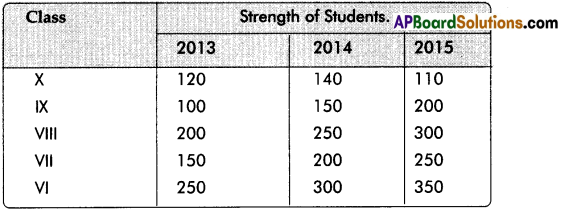
(11 – 12) Now, answer the following questions. Each question has four choices. Choose the correct answer and write (A), (B), (C) or (D) in your answer booklet.
Question 11.
Which class has the largest strength throughout ? ( )
A) VIII
B) IX
C) X
D) VI
Answer:
A) VIII
Question 12.
What is the difference in strength of class VI between 2013 and 2015 ? ( )
A) 100
B) 150
C) 50
D) 200
Answer:
A) 100
(13 – 16) Answer the following questions in one or two sentences each.
Question 13.
What does the table show ?
Answer:
The strength of students in different class during 2013 to 2015.
Question 14.
What difference do you find regarding class X ?
Answer:
There is a fall in 2015.
Question 15.
In which classes do you find gradual increase in strength ?
Answer:
From class VI to VIII.
Question 16.
In 2015 which class had the least number of students ?
Answer:
X class.

4.
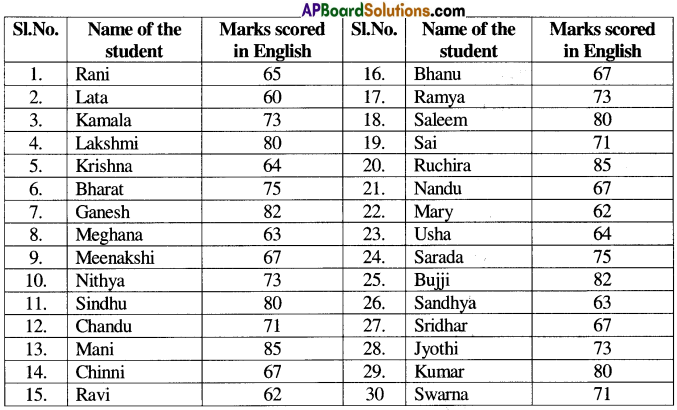
(11 – 12) Now, answer the following questions. Each question has four choices. Choose the correct answer and write (A), (B), (C) or (D) in your answer booklet.
Question 11.
Ravi scored __________ marks in English. ( )
A) 60
B) 61
C) 62
D) 63
Answer:
C) 62
Question 12.
Ruchira scored marks in English. ( )
A) 92
B) 85
C) 87
D) 84
Answer:
B) 85
(13 – 16) Now, answer the following questions. Each question has four choices. Choose the correct answer and write (A), (B), (C) or (D) in your answer booklet.
Question 13.
How many students have scored more than 70 marks ?
Answer:
17 Students have scored more than 70 marks.
Question 14.
Are there any students who have scored 90 marks ?
Answer:
None of the students have scored 90 marks.
Question 15.
How many students have failed in English ?
Answer:
None of the students have failed in English.
Question 16.
How many students have scored below 60 marks ?
Answer:
None of the students have scored below 60 marks.

Section – B : Vocabulary & Grammar
Questions 17 – 21:
5. Read the following passage focussing on the parts that are underlined and answer the questions given at the end. Write the answers in your answer booklet.
An eight-year-old child (17), Tess, heard her parents talking about her little brother, Andrew. All she knew was that Andrew was very sick and her parents did not (18) have enough (19) money for the treatment. They were moving to a smaller house because they could not afford to stay in the present house after paying the doctor’s bills. He needs a costly (20) surgery now and there was no one to loan them the money, so her parents lost there (21) hope and gave up their efforts.
Question 17.
Plural form of child. ( )
A) childs
B) children
C) childrens
D) childes
Answer:
B) children
Question 18.
Contracted form of did not ( )
A) didn’t
B) don’t
C) din’t
D) do not
Answer:
A) didn’t
Question 19.
Meaning of enough ( )
A) very less
B) less
C) hide
D) sufficient
Answer:
D) sufficient
Question 20.
Antonym of costly. ( )
A) cheap
B) costlier
C) costliest
D) cheapest
Answer:
A) cheap
Question 21.
Replace the word with the right word. ( )
A) them
B) their
C) that
D) his
Answer:
B) their

6. Trees are the most useful things in the world. Children play below (17) them. Travellers rest in their cool (18) shade. Trees give us fruit to eat but (19) firewood to burn. We build houses and make furniture with the wood of the trees. We need trees for our lives. If there were no trees, there would be no life on earth. Living things (people and animals) breathe in air. They breathe in oxygen from the air and breathe out carbon dioxide.
If all oxygen in the air was used up leaving only carbondioxide what would happen (20) to all of us? Everyone should (21) die.
Question 17.
Replace the underlined word with the right word. ( )
A) under
B) on
C) of
D) in
Answer:
A) under
Question 18.
What is the part of speech of the underlined word ? ( )
A) noun
B) adjective
C) adverb
D) preposition
Answer:
B) adjective
Question 19.
Replace the word with right word ( )
A) and
B) with
C) on
D) off
Answer:
A) and
Question 20.
Past form of the underlined word. ( )
A) happening
B) happens
C) happened
D) happenned
Answer:
C) happened
Question 21.
Replace the word with the right word ( )
A) will
B) would
C) shall
D) may
Answer:
B) would

Questions 22 – 26:
Complete the following passage choosing right words from those given below it. Each blank is numbered, and for each blank four choices (A), (B), (C) and (D) are given. Choose the correct answer from these choices and write (A), (B), (C) or (D) in your answer booklet.
7. Child Rights and You (CRY) is an organization that believes that children are citizens and they have their own __________ (22) at CRY, they do not believe in charity. (23) __________ do they run schools nor orphanages. (24) __________ they partner some basic level organizations working for children, their parents and (25) __________ CRY’s role is that of a bridge between child developmental organisations and people working for (26) __________ children.
Question 22.
A) rites
B) rights
C) writes
D) writings
Answer:
B) rights
Question 23.
A) Neither
B) Either
C) Nor
D) Or
Answer:
A) Neither
Question 24.
A) Although
B) Since
C) Inspite of
D) Instead
Answer:
D) Instead
Question 25.
A) communities
B) societies
C) groups
D) crowds
Answer:
A) communities
Question 26.
A) marginalisation
B) marginalled
C) marginalised
D) marginal
Answer:
C) marginalised

8. The Indus Valley Civilisation left (22) __________ crafted pottery that speaks volumes of the advances its people made. After 3,000 years, (23) __________ the ruins we leave behind are excavated, chances are only plastic bags would be dug up. It may sound like an (24) __________ but these bags are not biodegradable. (25) __________ causing emissions when these are manufactured noxious fumes are released while these are being burnt or (26) __________.
Question 22.
A) beauty
B) beautiful
C) beautifully
D) beautifulness
Answer:
C) beautifully
Question 23.
A) if
B) though
C) since
D) lest
Answer:
A) if
Question 24.
A) immigration
B) exaggeration
C) articulation
D) exemplification
Answer:
B) exaggeration
Question 25.
A) Addition from
B) However
C) Probably
D) Apart from
Answer:
D) Apart from
Question 26.
A) disposed off
B) disposed of
C) disposed in
D) disposed
Answer:
A) disposed off

Questions 27 – 31:
(Q. 27-31) Read the following passage. Five sentences are numbered. Each numbered sentence has an error. Find the error and write the correct answer in your answer booklet.
9. (27) When people in other places hear the story of Gates Avenue, they began to organise their own ‘clean up’ campaigns. (28) For 1913, more than seven thousand towns and cities (29) campaigns for painting but repairing homes and making better lives for the (30) people who lives in them. (31) Who knew what will happen when a teacher gives a little girl a new blue dress ?
Answer:
27. heard
28. Since
29. and repeating
30. live
31. knows
10. (27) “Why is it so quite here? Where are all the cars and lorries? (28) Where are the radios but the televisions? Where are all the lights?”
(29)”This is how it is at the country,” his cousin replied. “It’s always quiet in the country .Sometimes it is quieter than today. (30) My grandfather says that our village is the quietest between all the villages in our district.” “Oh! Is it? The country is a strange place,” said thetown mouse. (31) But he said to himself, “I don’t think I liked this place.”
Answer:
27. so quiet
28. and
29. in the
30. among
31. like this
Section – C : Conventions of Writing
Question 32:
Read the following passage carefully and supply punctuation marks (., ? ” “) and capital letters, wherever necessary. Also correct the spelling of the underlined word.
11. catch me if you can shouted arun and he ran ahead I’ll catch you in a minute replied Seema as she fallowed.
Answer:
“Catch me if you can,” shouted Arun, and he ran ahead. “I’ll catch you in a minute,” replied Seema, as she followed.
12. wonderful smiled the man a dollar and eleven cents, the exact price of a miracal for your little brother he took her money in one hand and held her hand with the other.
Answer:
“Wonderful”, smiled the man. “A dollar and eleven cents, the exact price of a miracle for your little brother!” He took her money in one hand and held her hand with the other.

Section – D : Creative Writing
Question 33:
13. Write a biographical sketch of Akkineni Nageswara Rao based on given profile.
Name : Akkineni Nageswara Rao
Born on : 20th September 1923, Ramapuram, A.P.
Occupation : Actor, producer, studio owner. (Annapurna)
Other names : Natasamrat, ANR
Married to : Annapurna
Carrer : 1941, 17 years old, 1st film – Dharmapathni Acted in over 255 films
Languages : Telugu, Tamil and Hindi films
Prominent Films : Devadasu, Ardhangi, Premabhishekam
Awards : 1) Dada Saheb Phalke Award
2) Nandi Awards Padma Bhushan Padma Vibhushan Padma Shri
Other Achievements : Prolific writer, charitable
Death : 22nd January 2014. (89 years)
Answer:
Biographical Sketch:
Akkineni Nageswara Rao, also known as ANR or Natasamrat was born on 20d September 1923 at Ramapuram in AP. Besides being a famous actor he was a producer and the owner of Annapurna studio. The studio was named after his wife Annapurna. He started his career in 1941, at the age of 17. He made his entry in Dharmapathni. He acted in more than 255 films in Telugu, Tamil and Hindi languages.
He has a huge fan following. His prominent films are Devadasu, Ardhangi, Premabhishekam. He received Dada Saheb Phalke Award and Nandi Awards for his huge contribution to cinema. He was honoured with the Padma Bhushan, Padmasri and Padma Vibhushan. Apart from being an actor, he was a prolific writer and a charitable person.
He died on 22 January 2014, at the age of 90.
(Or)
14. On the occasion of Teacher’s Day, give a speech on the ‘Role of Teachers in Education.”
Answer:
Good morning, honourable principal, respected teachers and my dear friends. First I wish all the teachers a happy teachers day.
I remember, the 1st day I stepped into the school. My nursery teacher held my hand and took me into the class. She was so loving and caring.
Teachers play a very important role in building our career, personality and the future. They guide us and teach us the difference between right and wrong. They mould our character and make us a good human being. We become doctors, lawyers, politicians, engineers and settle in our lives, we lead a happy life just because our teachers impart us knowledge and give us an understanding of the subject.
They are our 2 parent. They take every possible measure to improve our learning with remedial classes, extra attention in class etc. They understand our emotions and help us in difficulties.
No doubt, sages have said, Acharya Devo Bhava i.e., A teacher is like God who shapes our lives.
I thank you all for giving me this opportunity.

Question 34:
15. Your school is conducting an All India Sports Meet. Around 1500 students are participating in it. Volunteers are required for the smooth conducting of the meet. Write a notice in about 50 words inviting volunteers.
Answer:
Sahara League, Hyderabad.
NOTICE
Date: XX.XXXXXX
Volunteers for the All India Sports Meet
It’s an honour that our school is conducting the All India Sports Meet from 26th Oct to 3 Nov 2016 in our school premises. There are around 1500 participants from all over India. Volunteers are required for the smooth functioning of the meet and to make it a success. Those interested can give their names to the class teachers.
Volunteers will be gifted with SUPW certificate for their services.
Dheeraj Rao,
Sports Captain.
16. Write a story using the outlines given below with your own ideas. Assign a suitable title and moral.
salt merchant __________ has a donkey __________ carries __________ village to village __________ crossing slips __________ finds the bag light __________ trick __________ sits every time __________ to teach a lesson __________ cotton __________ sits __________ heavy __________ gives up.
Answer:
A Donkey And the Load of Salt
Once there was a salt merchant He had a donkey. He carried salt on it from village to village. One day they were crossing a river. All of a sudden the donkey slipped and fell down. When the donkey got up, it found the bag light. Now the donkey found the trick. It sat down in the stream every time it crossed it. The merchant understood its trick and wanted to teach it a lesson. Next day he put a bag of cotton on its back. The donkey sat down in the middle of the way in the stream. The wet cotton increased in weight. When the donkey got up, it found the load very heavy. Now it gave up its habit.
Moral : Tit for tat.
![]()
![]()
![]()
